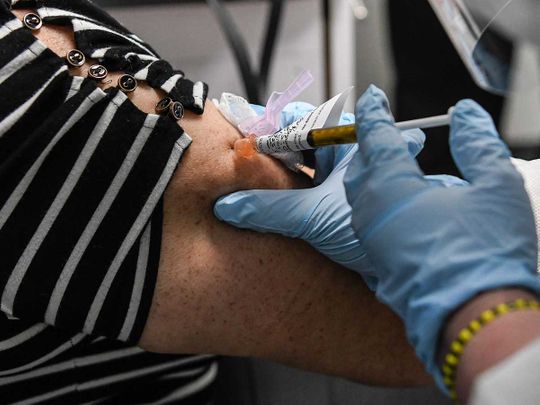
The international science journal ‘Nature’ recently surveyed over a hundred immunologists, infectious-disease experts, and virologists on whether the COVID-19 virus could be completely suppressed. Around 90 per cent agreed that it could remain endemic — as in, it will continue to circulate among different populations, though with much less virulence. As such, policymakers are scratching their heads to find a safe, ambitious road map for living with the COVID-19 virus once it turns endemic. This can be attained once most of the global population has built up immunity against the virus either through vaccination or infection and recovery.
Currently, the biggest vaccination campaign is underway, in a race to suppress the COVID-19 virus. Approved vaccines have been proven to reduce transmission and fatality rates, with discussions on yearly booster shots to further strengthen immunity. Currently, 30.4% of the world population has received at least one dose of a COVID-19 vaccine, and 15.8% is fully vaccinated. Conversely, only 1.1 per cent of people in low-income countries have received their first dose thus far, mainly due to limited vaccine supplies. However, international efforts are underway to secure vaccine supplies to low-income countries, such as those pledged by the UAE, Australia, and Europe.
Different sectors will still have to adhere to detailed COVID-19 mitigation and prevention plans that entail periodic sanitation requirements, quarantine requirements, maintaining physical distancing between groups attending indoor recreational activities, and guidelines on hosting large-scale events.
This is coming into full play as many European countries are planning to restrict access to crowded public spaces unless visitors can share a digital health pass validating their vaccination status or COVID-19 negative test results. The Italian government, for example, will activate the ‘green certificate’ health pass scheme for visitors to enter museums, galleries, theatres, cinemas, sports stadiums, theme parks, indoor swimming pools, spas, and indoor seating areas at restaurants.
With summer in full swing, many governments are easing restrictions to boost domestic and foreign tourism. Interestingly, countries are signing bilateral travel agreements with other countries that pose low risks for their populations. Entry requirements are easy to meet, such as proof of vaccination, negative PCR test results, or a report indicating recovery from COVID-19. Such precautions will remain in the future to suppress the transmission of the virus.
Many hospitals are raising concerns over patient backlogs, who have had to postpone their medical procedures and treatments due to COVID-19 patients receiving emergency treatment instead. Recently, there have been some reports that the waiting list for accessing the UK’s National Health Service could reach 13 million patients. Going forward, countries would need to upgrade their health care capacity and recruit sufficient numbers of health care workers to cater to seasonal surges in COVID-19 patients as well as current patient waiting lists.
Last year, we have witnessed extraordinary accomplishments with regards to discovering COVID-19 vaccines and treatments. Such investments will continue to be relevant in suppressing and preventing viral pandemics. Recently, the Biden Administration pledged a $3 billion investment to develop and manufacture a suite of antiviral treatments against viruses that trigger pandemics, including the current COVID-19 virus. Moreover, Dr. Anthony Fauci, director of the US National Institute of Allergy and Infectious Diseases, has made headlines lately for proposing to work on prototype vaccines that provide immunity against pathogens from 20 life-threatening virus families.
The pandemic has triggered an acceleration of digital transformation across government and private sector businesses, with much accolade and success. Many services are continuing to be revamped to be delivered electronically, reducing any possibilities for disruptions and loss of clients. On the other hand, pre-emptive digital solutions have enabled policymakers to formulate effective response plans to combat the pandemic. For example, the governments of South Korea and the US have been able to track coronavirus hotspots according to various variables, thanks to investment in cutting-edge data analytics.
During the pandemic when most hospitals and clinics were overwhelmed with COVID-19 patients, tele-health services thrived as an alternative way of accessing medical services. Patients were able to receive timely consultations, diagnosis, mental health services, follow-up post-hospitalisation, and care strategies in the case of life-threatening medical issues.
Along the same spirit, remote employees were able to continue their work, thanks to a variety of innovative digital technologies that allow for collaboration and virtual meetings. Schools and universities were able to migrate their students online, aided with many distance learning solutions available in the market. At the same time, many enterprises shifted their operations towards e-commerce and online shopping, enabling consumers to easily shop for products and services, then have them delivered to their doorsteps. This trend will continue to grow in strength as enterprises find them pivotal to sustain and grow their revenues. Interestingly, the Singaporean government has introduced special grants that fund digital transformation solutions among small and medium enterprises.
That being said, much of the responsibility for reducing transmission rates would fall heavily on individuals. The lifting of COVID-19 restrictions come with the caveat of making sound decisions when it comes to ensuring good personal hygiene, social distancing, wearing protective gear, and quarantining when unwell. As such, public health awareness campaigns must continue to run to ensure adhere to these guidelines.
The advent of the COVID-19 pandemic to our world has forced us to embrace a new normal. As such, countries should rely on its inventiveness to carve out an improved post-pandemic world. With remarkable advances in science, technology, and behavioural sciences, we can certainly make this vision come true.
Sara Al-Mulla is an Emirati civil servant with an interest in human development policy and literature











